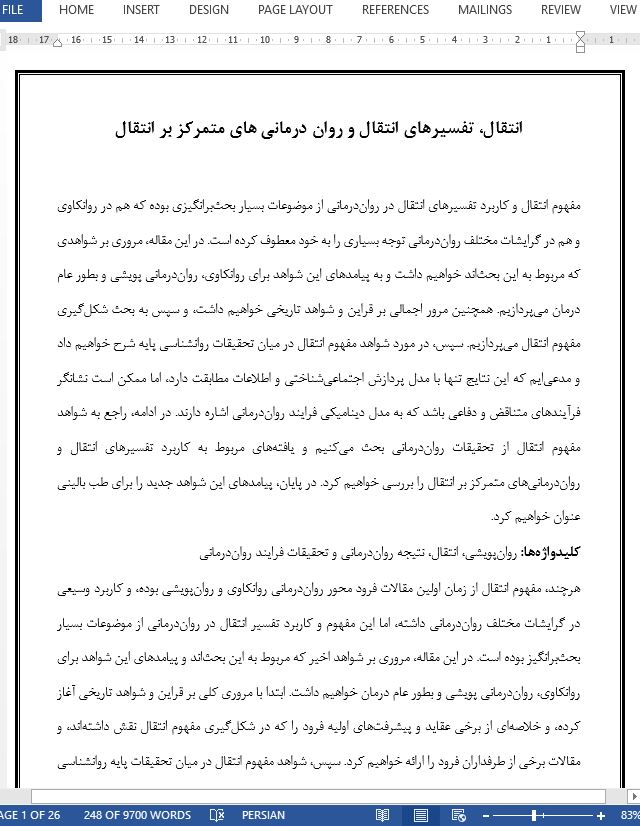| دانلود رایگان مقاله انگلیسی + خرید ترجمه فارسی | |
| عنوان فارسی مقاله: |
انتقال، تفسیر انتقال و روان درمانی متمرکز بر انتقال |
| عنوان انگلیسی مقاله: |
Transference, Transference Interpretations, and Transference-Focused Psychotherapies |
|
|
|
| مشخصات مقاله انگلیسی (PDF) | |
| سال انتشار | 2012 |
| تعداد صفحات مقاله انگلیسی | 13 صفحه با فرمت pdf |
| رشته های مرتبط با این مقاله | روانشناسی و پزشکی |
| گرایش های مرتبط با این مقاله | روانشناسی بالینی و روانپزشکی |
| چاپ شده در مجله (ژورنال) | روان درمانی – Psychotherapy |
| کلمات کلیدی | روان پویشی، انتقال، نتیجه روان درمانی و تحقیقات فرایند روان درمانی |
| ارائه شده از دانشگاه | دانشگاه ایالتی پنسیلوانیا |
| نویسندگان | Kenneth N. Levy and J. Wesley Scala |
| شناسه شاپا یا ISSN | ISSN 0033-3204 |
| شناسه دیجیتال – doi | https://doi.org/10.1037/a0029371 |
| رفرنس | دارد ✓ |
| کد محصول | 9490 |
| لینک مقاله در سایت مرجع | لینک این مقاله در نشریه APA |
| نشریه APA |  |
| مشخصات و وضعیت ترجمه فارسی این مقاله (Word) | |
| وضعیت ترجمه | انجام شده و آماده دانلود |
| کیفیت ترجمه | طلایی⭐️ |
| تعداد صفحات ترجمه تایپ شده با فرمت ورد با قابلیت ویرایش | 26 صفحه با فونت 14 B Nazanin |
| منابع داخل متن | به صورت فارسی درج شده است ✓ |
| فهرست مطالب |
|
مروری اجمالی بر قراین و شواهد تاریخی شکلگیری مفهوم انتقال تعریف انتقال شواهدی برای مفهوم انتقال تحقیقات پایه تحقیقات فرآیند رواندرمانی تحلیل و تفسیرهای انتقال تفسیرهای انتقال در تحقیقات رواندرمانی رواندرمانیهای متمرکز بر انتقال رواندرمانی متمرکز بر انتقال اولین مطالعه تجربی در مورد تفسیرهای انتقال نتیجهگیری و خلاصه مطالب |
| بخشی از ترجمه |
|
چکیده مفهوم انتقال و کاربرد تفسیرهای انتقال در رواندرمانی از موضوعات بسیار بحثبرانگیزی بوده که هم در روانکاوی و هم در گرایشات مختلف رواندرمانی توجه بسیاری را به خود معطوف کرده است. در این مقاله، مروری بر شواهدی که مربوط به این بحثاند خواهیم داشت و به پیامدهای این شواهد برای روانکاوی، رواندرمانی پویشی و بطور عام درمان میپردازیم. همچنین مرور اجمالی بر قراین و شواهد تاریخی خواهیم داشت، و سپس به بحث شکلگیری مفهوم انتقال میپردازیم. سپس، در مورد شواهد مفهوم انتقال در میان تحقیقات روانشناسی پایه شرح خواهیم داد و مدعیایم که این نتایج تنها با مدل پردازش اجتماعیشناختی و اطلاعات مطابقت دارد، اما ممکن است نشانگر فرآیندهای متناقض و دفاعی باشد که به مدل دینامیکی فرایند رواندرمانی اشاره دارند. در ادامه، راجع به شواهد مفهوم انتقال از تحقیقات رواندرمانی بحث میکنیم و یافتههای مربوط به کاربرد تفسیرهای انتقال و رواندرمانیهای متمرکز بر انتقال را بررسی خواهیم کرد. در پایان، پیامدهای این شواهد جدید را برای طب بالینی عنوان خواهیم کرد.
نتیجهگیری و خلاصه مطالب |
| بخشی از مقاله انگلیسی |
|
Abstract The concept of transference and the use of transference interpretations in psychotherapy have been highly controversial topics garnering frequent attention both within psychoanalysis and across multiple orientations of psychotherapy. In this article, we review the empirical evidence as it bears on this controversy and discuss the implications of the evidence for psychoanalysis, psychodynamic psychotherapy, and therapy in general. We provide a brief historical and contextual overview, followed by a discussion of the development of the concept of transference. We then discuss the evidence for the concept of transference from basic psychological research and contend that these findings are not only consistent with a social– cognitive and information processing model, but that they may also indicate conflict and defensive processes suggestive of a dynamic transference process model. We continue with a discussion of the evidence for the concept of transference from psychotherapy research and examine process findings relating to the use of transference interpretations and transference-focused psychotherapies. Finally, we present the implications of this emerging evidence for clinical practice.
Conclusions/Summary Good experimental evidence has emerged from both social psychological findings and psychotherapy process and outcome research that supports the concept of transference. To reiterate our earlier definition of transference, we conceptualize it as a tendency in which representational aspects of important and formative relationships (such as with parents and siblings) can be both consciously experienced and/or unconsciously ascribed to other relationships (Levy, 2009). This conceptualization of transference is consistent with what is known about schemas and pattern matching, implicit memory processes, and other concepts from cognitive and neuroscience. However, there is also some burgeoning evidence that transference is not just a cognitive-information bias or process, but that it is also a dynamic process related to attachment and defensive processes. Nevertheless, these findings are preliminary and need to be confirmed in future research. Early correlational data from psychotherapy research found that transference interpretations were negatively correlated to outcome, particularly for those with low QOR. Some data suggest that the accuracy and competent delivery of interpretation as well as the correspondence of the interpretations to the therapist’s treatment plan predict good outcome (Crits-Christoph et al., 1988). This held true, even after controlling for alliance, and the hypothesis that accuracy would have its greatest impact in the context of good alliance was also not confirmed. Future research should not only be concerned with controlling for the alliance but also with controlling for other indicators of good psychotherapy skill.
|
|
تصویری از مقاله ترجمه و تایپ شده در نرم افزار ورد |
|
|
| دانلود رایگان مقاله انگلیسی + خرید ترجمه فارسی | |
| عنوان فارسی مقاله: |
انتقال، تفسیر انتقال و روان درمانی متمرکز بر انتقال |
| عنوان انگلیسی مقاله: |
Transference, Transference Interpretations, and Transference-Focused Psychotherapies |
|
|
|

همه چیز را پولی ساختن مشکل مردم را در نظر بگیرید
سلام. می توانید از مقالات با ترجمه رایگان سایت ترجمه فا استفاده کنید.